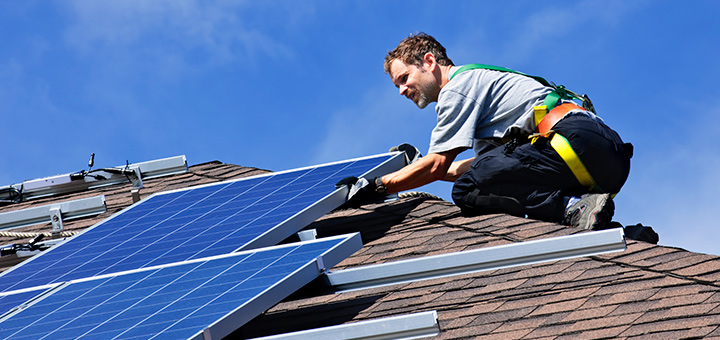What You Should Know Before Installing Solar Panels on Your Home

As the push toward renewable energy intensifies, homeowners are increasingly looking upward—to their rooftops—for solutions. Solar panels offer a sustainable and cost-effective way to reduce utility bills and carbon footprints. However, the journey to solar energy isn’t as simple as placing panels on your roof. There are several critical considerations that homeowners must weigh before moving forward with solar panel installation.
Whether you’re living in a sun-soaked region like Arizona or simply trying to be more energy-efficient, understanding what goes into a successful solar setup can help you avoid costly mistakes. Here’s what you should know before making the leap to rooftop solar
1. Evaluate Your Roof’s Condition and Orientation
Before you even get quotes, take a good look at your roof. The condition, size, angle, and direction it faces will significantly impact the effectiveness of your solar system.
- Age and Condition: If your roof is more than 15-20 years old, you might need to replace it before installing panels. It’s often more cost-effective to do roofing work beforehand than to uninstall and reinstall panels later.
- Direction and Tilt: South-facing roofs typically receive the most sunlight in the Northern Hemisphere. East- and west-facing roofs can still be viable but might produce less energy.
- Shading: Nearby trees, buildings, or chimneys casting shadows can reduce panel efficiency. A solar site assessment can help identify these issues.
2. Understand Local Building Codes and Permits
Solar panel installation is not just a technical task—it also involves local government regulations. Each municipality may have its own codes and permitting requirements.
- Zoning Regulations: Some areas restrict the height or appearance of rooftop additions. Check with your local planning office.
- HOA Rules: If you live in a community governed by a homeowners association, be sure they permit solar installations and clarify design restrictions.
- Permitting Process: A reputable solar company in Phoenix AZ will usually handle permits, but it’s still wise to understand what’s required in your area.
3. Check Your Energy Consumption and Goals
Before installing solar panels, review your household’s energy usage. This will guide the system size you need and help you calculate your return on investment.
- Average Monthly Use: Look at your electricity bills over the past year to determine your average kilowatt-hour (kWh) usage.
- Energy Efficiency: Improving your home’s insulation, windows, and appliances can lower your consumption and reduce the number of panels required.
- Future Planning: If you plan to buy an electric vehicle or expand your home, factor in those changes when designing your solar system.
4. Grid-Tied vs. Off-Grid Systems
One of the earliest decisions you’ll face is whether to connect to the utility grid or go completely off-grid. Each option has pros and cons.
- Grid-Tied Systems: These are the most common and allow you to draw power from the grid when your system doesn’t produce enough energy. Excess energy can often be sold back to the utility via net metering.
- Off-Grid Systems: These require battery storage to operate independently. While they provide complete energy autonomy, they’re generally more expensive and complex to maintain.
5. Explore Incentives and Rebates
Solar isn’t just good for the environment—it can also be financially rewarding, especially when you take advantage of government incentives.
- Federal Tax Credit: Homeowners in the U.S. can claim a federal tax credit of up to 30% of the system cost.
- State and Local Incentives: States like Arizona offer additional tax benefits, rebates, and performance-based incentives.
- Utility Rebates: Some local utilities provide direct rebates or discounted rates for solar users. A solar company in Phoenix AZ can help you identify and apply for these programs.
6. Compare Solar Providers Carefully
Not all solar companies are created equal. Take time to compare several providers to ensure you get the best combination of quality, service, and price.
- Experience and Credentials: Choose companies with proven track records, proper licensing, and NABCEP certification if possible.
- Warranties: A strong warranty on both the equipment and installation work can protect your investment
- Customer Reviews: Check online reviews, BBB ratings, and ask for customer references. Local companies often provide more personalized service.
7. Review Financing Options
Solar panel installation is a significant investment, but there are multiple ways to finance it beyond paying cash upfront.
- Solar Loans: These allow you to own the system while making manageable monthly payments.
- Leases and PPAs: With these options, a third party owns the panels and you pay a fixed monthly rate. While this reduces upfront costs, you may save less in the long run.
- Home Equity Loans: Some homeowners use HELOCs or refinancing to fund their solar upgrades at lower interest rates.
8. Understand the Timeline and Installation Process
Knowing what to expect can help ease the process and ensure everything goes smoothly.
- Timeline: From initial consultation to flipping the switch, installation can take anywhere from 4 to 12 weeks, depending on permitting and equipment availability.
- Installation Day: Most residential installs are completed in 1–3 days. Make sure access is clear and pets are secured.
- Inspections and Activation: After installation, your system will need to be inspected by the local building authority and your utility before it can be activated.
9. Plan for Maintenance and Monitoring
Solar systems are generally low-maintenance, but occasional cleaning and system checks are important.
- Cleaning Panels: Dust and debris can reduce efficiency. In places like Phoenix, occasional rainfall may help, but a professional cleaning once or twice a year is ideal.
- Monitoring Tools: Many systems come with online dashboards or mobile apps that track performance and alert you to issues.
- Warranty Service: Make sure your installer provides ongoing support in case repairs are needed.
10. Think Long-Term: Resale Value and Sustainability
Finally, consider how going solar aligns with your long-term homeownership and environmental goals.
- Home Value: Studies show that solar panels can increase property value, especially when the system is owned (not leased).
- Sustainability Impact: A typical residential solar system offsets more than 3 tons of carbon emissions annually—the equivalent of planting over 100 trees each year.
- Durability: Solar panels typically last 25–30 years, with some systems continuing to generate power well beyond that.
Rooftop solar is a powerful way to harness clean energy and reduce utility costs, but it’s not a one-size-fits-all solution. By thoroughly assessing your roof, understanding the local regulations, planning financially, and choosing a reputable solar company in Phoenix, AZ, you can make a smart, sustainable investment.
Going solar is a journey—one that requires foresight and thoughtful planning. But with the right knowledge and preparation, it’s a journey well worth taking.




